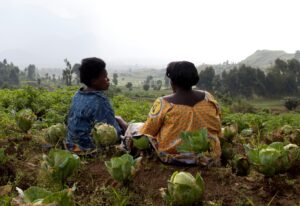
On average, 66% of respondents to ECI’s opinion polling stated that economic development is important to them, making the economy the single highest priority of the Congolese people, even higher than security concerns. And though 45% of respondents believe that the situation will improve, there was a clear regional disparity in economic confidence. People polled in the eastern provinces were more than twice as likely to be pessimistic about their personal economic future as their counterparts in the west of the country.
The DRC has posted consistent macroeconomic gains in the past few years, however few Congolese felt any resulting positive impact, leading 63% of survey respondents to believe that these gains are not shared by all. Sustainable economic growth needs to include all segments of the population to contribute to a lasting peace in eastern Congo, especially women, who have traditionally been left out from many parts of the economy.
Kabare, a farming community in South Kivu, has faced an increase in poverty and malnutrition rates in recent years. Regional instability has reduced the amount of land that can be farmed, which has in turn lowered household incomes. Women have been disproportionately affected – many women’s access to land is still limited by traditional customs, meaning that their already limited economic autonomy has been further reduced by recent events.
In December 2013, ECI began working with Action for Hope (Action d’Espoir, ADE) to reduce poverty, improve health, and empower women in Kabare. Our joint project began by training 300 women farmers in good agricultural practices, including soil management, irrigation and seed preparation. The women have now organized ten Farmer Business Associations (FBAs) to find local markets for their produce. The FBAs have also established accounts with local microfinance institutions, allowing the women to obtain small loans for investment in their businesses.
